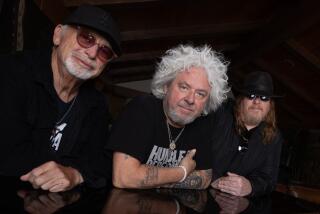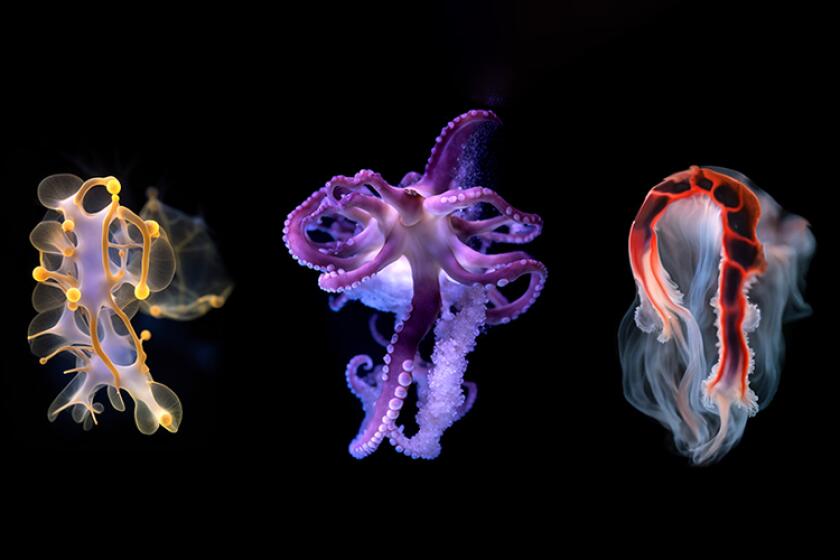The Downstairs Diva : Ealynn Voss Gives Up Housekeeping for the Uncertain World of the Opera Singer
Ealynn Voss doesn’t look like a diva or act like a diva. How could she?
For 14 years the dramatic soprano, who makes her Music Center Opera debut tonight in Richard Strauss’ gory Freudian shocker “Elektra,” was employed as a live-in housekeeper.
The singing career she sought, after graduating from Oberlin College, just didn’t materialize. Nor did anything come of her mid-1970s audition tour of Europe, except a chance meeting with the late Jan Popper, who invited her to audition for his UCLA opera workshop.
When that too fizzled, she effectively retreated--to a niche in Malibu, taking care of other people’s children, cooking and cleaning. It seemed a reasonable thing to do from her perspective--that of a small-town girl from a poor family in Elizabeth, Pa.
“I didn’t have the street smarts or the pushiness to maneuver myself into position,” says the cheery, bedimpled singer, settling into a chair, next to a humidifier that protects her vocal cords.
“Someone once told me that I needed to grow up to my voice, that I had to gain more sophistication to succeed in this business. But I didn’t know where a course like that was offered, so I signed on for housework.”
The families she worked for accepted her as their own, offering the comfort of belonging. And if she tried to blot out the hole in her aspirations by feeling loved and protected, “the void--not singing--was undeniable.
“At the end of every exhausting day I remember staring out at the ocean and pondering what to do with this voice--ignore it? I just couldn’t find my way into the real music world.
“There was this sense of great discouragement--a lot of it coming from a misplaced trust in people. At least waxing floors was safe. It was my therapy. And did they shine.”
Personable and candid, Voss does not seem like someone who hides from the crowd. But she was undoubtedly caught in an identity glitch. Elvirta Lynn Winkelvoss’ parents, first generation German Americans--her father, a Pittsburgh steelworker--”would have thought I’d made it by being on the Lawrence Welk show.”
Nevertheless, they doted on their only child and gave her the music lessons dictated by obvious gifts. That she now did housework (“cooking, nesting, making nice for people”) never seemed unusual to her, even though she holds a college degree.
But Voss admits that other issues went into abandoning “the art that haunted me” for so long:
“ ‘Oh, Dad,’ I remembered saying. ‘I’m not like the other girls. I’m too big. There are no prom dates for me. Maybe there won’t be any invitations to sing either. But he had a great answer: ‘Well, if you don’t make it as a singer you can always try out for the Steelers.’ ”
It is that very wit, she explains, that keeps her Easy Spirit feet on the ground, even now, after being praised last year by The Times’ music critic, Martin Bernheimer.
Of Voss’ performance in Opera Pacific’s production of Puccini’s “Turandot” last season, Bernheimer wrote: “Hats off, gentlemen . . . a voice of steel, an Italian Brunnhilde, a soprano who can dominate a massive orchestra, a convulsive chorus and . . . a highly competitive tenor.”
Voss’ road to the opera stage began when she answered an ad in a local Malibu paper for a part-time church choir director. That job led to singing solos at another church where she met the retired Metropolitan Opera bass-baritone Giorgio Tozzi.
“What happened to me from that moment on I owe to Giorgio and his wife Monte,” says the Music Center debutante.
“They became my friends. They worked with me for six years. They identified my Fach , the dramatic soprano category. They made a tape and sent it to Birgit Nilsson, who also took me in hand. They sent for all their opera-producer buddies.”
As a result Voss left Los Angeles in 1988, launched on a career that took her to American regional opera companies, Europe and Australia. Now, at 41, she finally has management, CAMI, with consultation from singing maven Matthew Epstein and intermittent coaching from various teachers.
Her humor, even now, with the anxiety of this major debut, is a constant source of strength. In rehearsal with director David Pountney, she confronts a line describing Chrysothemis (her role) as a young woman of “slender ankles and supple hips.”
Laughing, the singer asks Pountney to “get out the spray paint” if he insists on illusions.
He tells her to “be small.” She tells him to “be real”--a remark, she says, “I couldn’t have uttered 15 years ago.” It was “Nilsson who said that a voice like this cannot be housed in an upright: it needs a 9-foot grand.”
But Voss has plenty of moments when “the corny, sentimental me comes out,” when she longs to be in Elizabeth at her tiny house on the Monongahela River with bunnies running around the yard.” She cries unabashedly when talking about how her parents “experienced so much hurt because they didn’t have the means to help me.
“And now, in a work that is a total stretch for this beginner, I say my little prayer. OK, Bobo (a nickname for her late father), get your gang together and come out to help your kid. She’s scared.”
With experience, Ealynn Voss may lose her novice jitters. It’s a new life and a new identity she’s embarked on. In July she sings Turandot at New York City Opera. And for 1993, she holds a contract to sing Aida. with L.A. Music Center Opera.
“I always needed a cocoon to survive in. But now I’ve burst out of it. Am I a butterfly yet? Others will have to decide.”
More to Read
The biggest entertainment stories
Get our big stories about Hollywood, film, television, music, arts, culture and more right in your inbox as soon as they publish.
You may occasionally receive promotional content from the Los Angeles Times.






